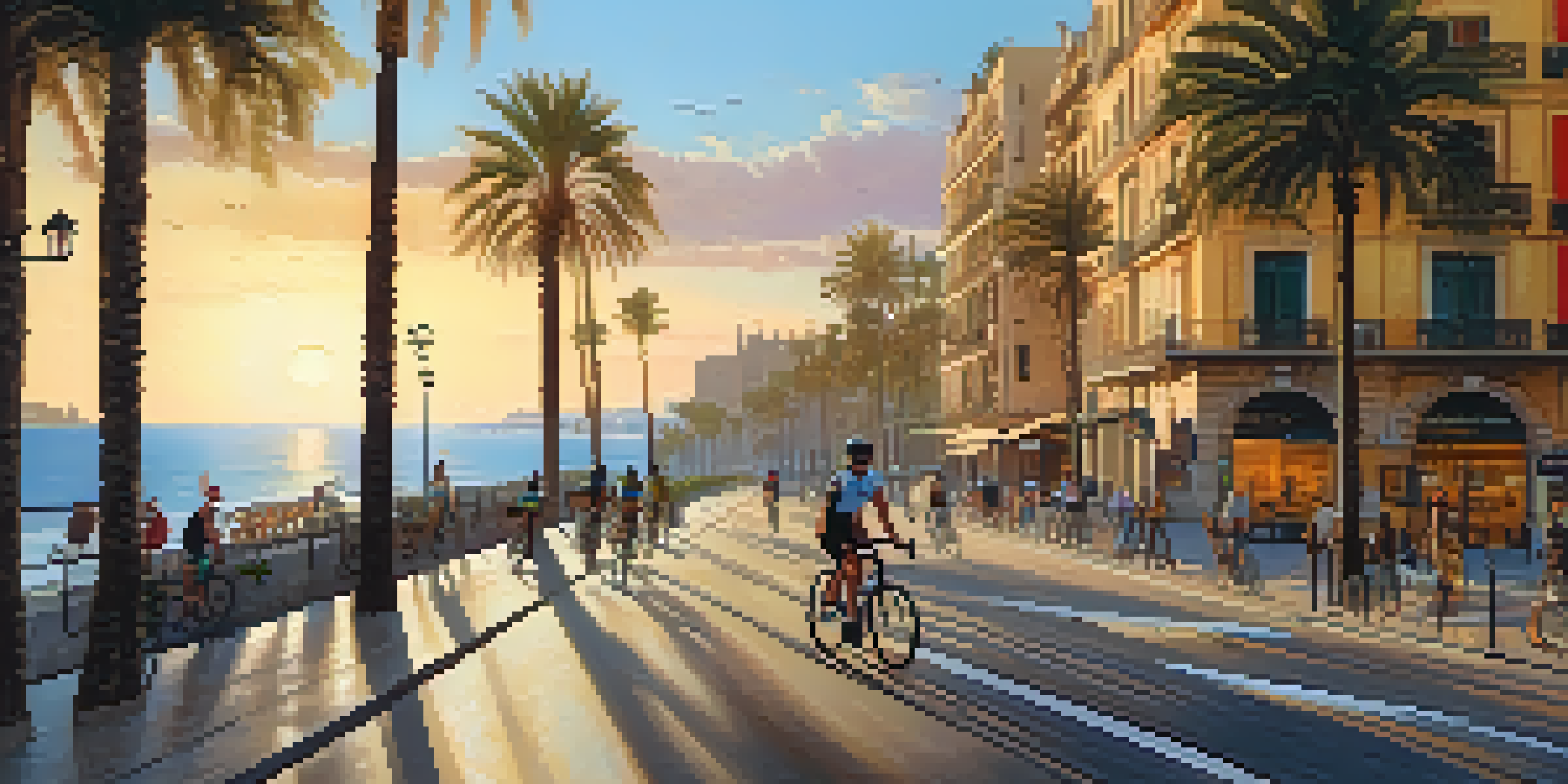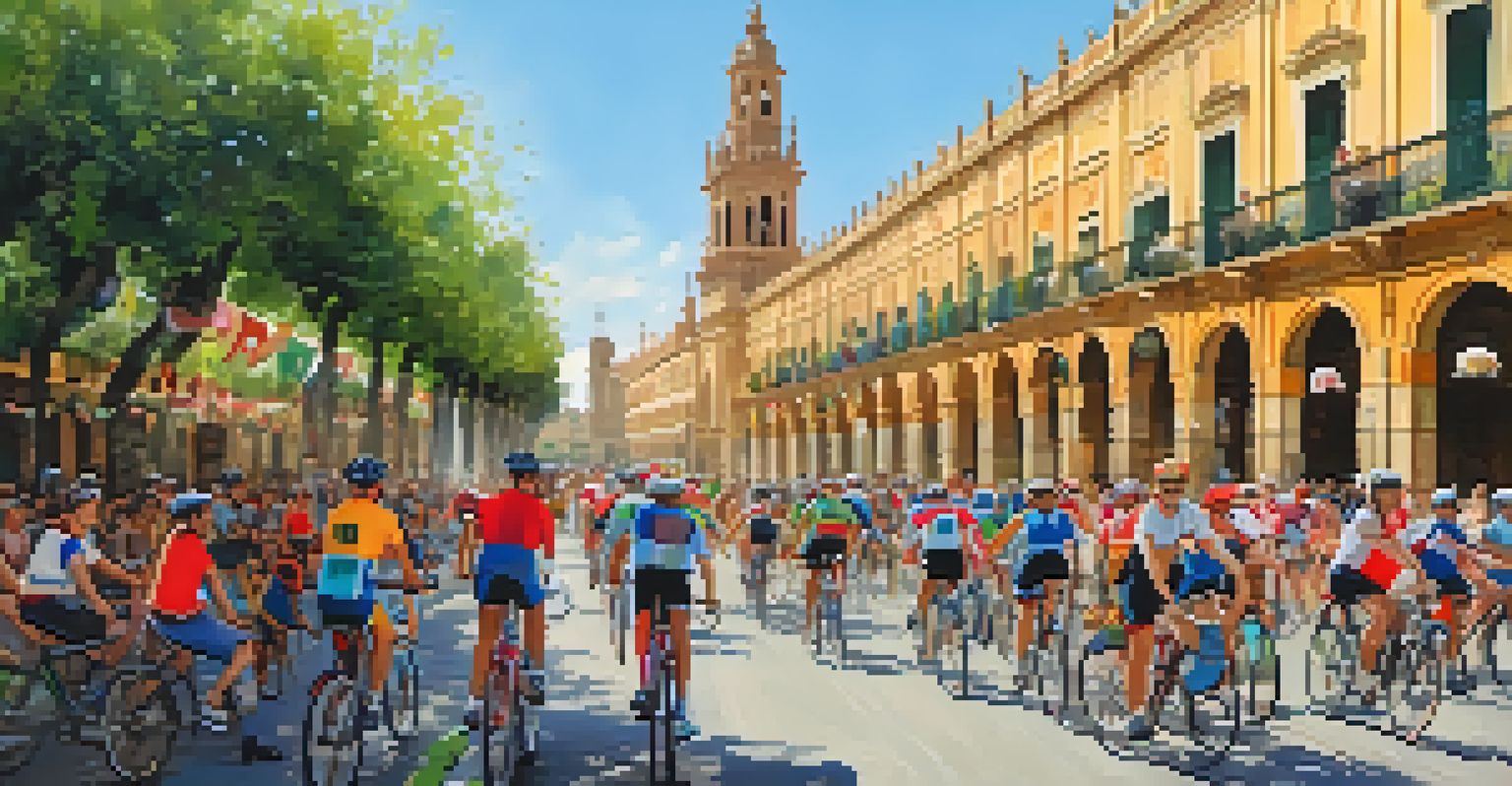Spain's Bicycle-Friendly Cities: A Comprehensive Overview

Why Cycling is Growing in Popularity in Spain
In recent years, cycling has emerged as a popular mode of transportation in Spain. This trend is fueled by a growing awareness of environmental issues and a desire for healthier lifestyles. Many Spaniards are swapping cars for bikes, enjoying the freedom and flexibility that cycling offers.
Life is like riding a bicycle. To keep your balance, you must keep moving.
Cities across the country are recognizing this shift and are investing in bicycle infrastructure. This includes dedicated bike lanes, bike-sharing schemes, and improved road safety measures. Such initiatives make cycling not just a leisure activity, but a practical option for daily commuting.
As a result, Spain is seeing an increase in local cycling communities and events. From organized rides to advocacy groups, the cycling culture is thriving, making it an exciting time for both residents and visitors to explore the country on two wheels.
Barcelona: A Cyclist's Dream with Expanding Infrastructure
Barcelona is one of the leading cities in Spain when it comes to bicycle friendliness. The city boasts an extensive network of bike lanes that connect key areas, making it easy for cyclists to navigate. Additionally, the popular Bicing bike-sharing program allows residents and tourists to rent bikes conveniently.

Moreover, Barcelona's commitment to sustainability and reducing traffic congestion further enhances its appeal for cyclists. With initiatives like 'superblocks' that restrict vehicle access in certain areas, the city creates safer and more enjoyable spaces for biking.
Cycling Gains Popularity in Spain
Many Spaniards are embracing cycling as a sustainable and healthy alternative to cars, aided by improved infrastructure.
Cycling in Barcelona isn't just about getting from point A to B; it’s an experience. Riders can enjoy stunning views of the Mediterranean coastline, explore historic neighborhoods, and discover local cafés, all while pedaling through the vibrant city.
Madrid: A City on the Move with Cycling Initiatives
Madrid is rapidly transforming into a bicycle-friendly metropolis, with the introduction of numerous cycling initiatives. The city has expanded its network of bike lanes and has been promoting cycling as a viable mode of transport. These efforts are part of Madrid's broader strategy to reduce pollution and improve urban mobility.
Cycling is the nearest thing to flying.
Moreover, the Madrid City Council has implemented the 'Madrid Central' initiative, which restricts access for cars in certain areas, allowing cyclists to feel safer and more secure. This initiative aims to create a cleaner, greener city, making cycling an appealing option for daily commutes.
Cycling in Madrid offers the chance to explore iconic landmarks like the Royal Palace and Retiro Park. With a mix of culture, history, and modern amenities, cyclists can enjoy the best of both worlds while contributing to a more sustainable environment.
Valencia: Combining Culture and Cycling
Valencia stands out as a bicycle-friendly city thanks to its flat terrain and extensive bike lanes. The city has made significant investments in cycling infrastructure, making it easy for both locals and tourists to explore on two wheels. With over 100 kilometers of bike lanes, it’s a cyclist's paradise.
Beyond the practical aspects, Valencia offers a unique cultural backdrop for cyclists. Riders can enjoy a scenic tour of the Turia Gardens, a former riverbed transformed into a beautiful park, while also visiting historic sites like the City of Arts and Sciences.
Major Cities Enhance Cycling Infrastructure
Cities like Barcelona, Madrid, and Valencia are investing in bike lanes and bike-sharing programs to promote cycling.
Valencia also hosts various cycling events throughout the year, fostering a strong community of cycling enthusiasts. This vibrant atmosphere encourages more people to take up biking, making it an integral part of the city's lifestyle.
Seville: The Champion of Urban Cycling
Seville has earned a reputation as one of the best cities for cycling in Spain, with an impressive network of bike lanes. The city has embraced cycling as a primary mode of transport, resulting in a significant increase in bike usage among residents. This transformation is a result of deliberate planning and investment in cycling infrastructure.
In Seville, cyclists can enjoy a safe and pleasant experience thanks to the dedicated bike lanes that are separated from traffic. This design not only enhances safety but also encourages more people to choose cycling over driving.
The annual bike festivals and community rides in Seville further highlight the city's love for cycling. These events create a sense of camaraderie among cyclists and showcase the joy of exploring the city on two wheels.
Bicycle-Friendly Policies in Spanish Cities
Many Spanish cities are adopting bicycle-friendly policies aimed at promoting cycling as a sustainable form of transportation. These policies often include incentives for businesses to provide bike parking, as well as educational programs that encourage safe cycling habits.
Cities like Bilbao and Málaga are also implementing similar strategies, ensuring that cycling becomes an integral part of urban planning. These initiatives aim to create a more inclusive environment for cyclists, making it easier for everyone to join the cycling movement.
Community and Culture Thrive on Bikes
Local cycling events and a strong community spirit are fostering a vibrant culture of cycling across Spain.
As cities prioritize cycling, they are not only addressing environmental concerns but also enhancing the quality of life for their residents. The focus on pedestrian and cyclist-friendly infrastructure contributes to healthier communities.
The Future of Cycling in Spain: Challenges and Opportunities
While Spain has made great strides in becoming more bicycle-friendly, challenges remain. Issues such as traffic congestion, road safety, and the need for further infrastructure improvements continue to be pressing concerns. However, many cities are actively working on solutions to these problems.
The future of cycling in Spain holds immense potential, with ongoing efforts to enhance cycling networks and promote public awareness. As more people recognize the benefits of cycling, cities are likely to prioritize investments in this area.

With a collective push from local governments, communities, and cyclists themselves, Spain’s cycling landscape can continue to evolve. This collaborative spirit is essential in making cycling a sustainable, enjoyable, and safe mode of transport for all.
Tips for Exploring Spain by Bicycle
Exploring Spain by bicycle is an exhilarating way to experience the country. To make the most of your cycling adventure, consider renting a bike from local shops or using bike-sharing services available in major cities. This way, you can easily navigate through popular attractions and hidden gems.
Be sure to familiarize yourself with local cycling laws and etiquette. Wearing a helmet and signaling your turns are essential for your safety and the safety of others on the road. Additionally, try to avoid peak traffic hours to ensure a more pleasant ride.
Finally, take the time to enjoy the journey. Cycling through Spain allows you to soak in the beautiful landscapes, sample local cuisine at roadside eateries, and interact with friendly locals. Embrace the experience, and let the open road lead you to unforgettable memories.